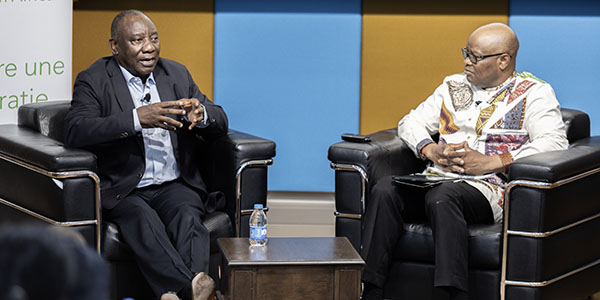ANC President and Head of State speaks at Wits
- Wits University
It was the big Cs: coalitions, corruption and crime that dominated questions put to President Cyril Ramaphosa by the Wits community.

In the latest dialogue with politicians ahead of the May 29 elections, President of the African National Congress (ANC), Cyril Ramaphosa, sat down to engage with Witsies. The dialogue, hosted by the Wits School of Governance (WSG), is the latest in the series themed In their Voices and through their Lenses.
The conversation on Friday, 10 May, homed in on the state of the ruling party at 30 years in government. The spotlight focused on how the ANC has fared, its failings, and where it sets its sights beyond the elections of 29 May.
WSG's Professor Adebayo Olukoshi facilitated the conversation and raised the top-of-mind issues that the ANC faces, including the key question of coalitions, corruption and crime during the two-hour long session.
With the election countdown now in its last days, some polls suggest that the ANC will for the first time since coming to power in 1994 dip below the 50% majority mark at the ballot box. In this scenario it will mean the ANC will have to enter into coalitions, Olukoshi set out.
Ramaphosa however, dismissed the pollsters and analysts, and said: “For the past six times [of voting] the governing party has been met with a real handsome majority. Where I sit, I feel, sense and smell that essentially the same thing is going to happen… that’s why I never dream or even contemplate of a collision … It’s not even in my framework.”
Ramaphosa said that coalitions, where they have not been anchored by a large majority party have shown inherent weakness. He called them “completely unworkable” and that they have negative knock-on effects for citizens, he said, citing the example of the Tshwane Municipality.
Corruption was another issue raised, as the ANC has been plagued with corruption and capture. Ramaphosa himself called the time under his predecessor, Jacob Zuma, the “nine lost years”. Nine years make up nearly a third of the ANC’s time in power. Ramaphosa conceded that corruption “is viewed as a main drawback to development”. But he said the private sector had to bear equal blame for corruption and also said the ANC had inherited a corrupt government from the apartheid state in 1994 that did not have a free media or many well-functioning departments.
He said: “Quite often people tend to think that everyone in the public sector is corrupt, without focusing on some of the origins of corruption. Because it is often those who want to advance their business interests who go out of their way to go and tempt those in the public sector and corrupt them… so it’s both the public and private sector.
“We also took over a hugely corrupt government, because apartheid inherently was corrupt.”
Crooks in the criminal justice system
Ramaphosa said the ruling party has been able to reform the revenue service and to reposition the National Prosecuting Authority which he admitted “had been captured” but is “now free from political interference”.
He added: “I can enable the NPA, enable the police and to enable everyone who has to do work against corruption to do their work … that is one thing that I swore to do and is exactly what I’m doing.”
The issue of high levels of crime; distrust in police’s will and competence to do their jobs professionally and effectively; and the everyday safety and security people fears and anxieties that South Africans live with were also raised in the Q&A section of the dialogue.
Ramaphosa, who said he was a one-time police reservist, conceded that “yes, we face a problem of some corrupt police”. He added though that there has been a renewed determination to ensure corrupt and ill-disciplined police are identified, investigated, arrested and charged.
The ANC leader added that socio economic challenges drive up crime and criminality. He said: “When people are able to migrate out of poverty, and are able to live a better life and we restore dignity to them then they will be drawn less and less to criminality, to drugs and gang violence.”
Youth Unemployment and new industries
Another issue put to Ramaphosa, was how the ANC intends to address high levels of unemployment, in particular youth unemployment and how the structure of the economy will adapt as the impact of AI threatens more job losses.
Ramaphosa did not address the AI threat directly. He pointed to years of low growth as a result of commodity prices impacting South Africa’s mineral extraction based economy. He also said that there are too many monopolies, concentrating the manufacturing and distribution industries in the hands of a few. “This has restricted our economy and it means we are not functioning on all cylinders.”
He however, pointed to black economic empowerment; increased digital access in the country and the introduction of sector master plans as contributors to stimulating the economy. Master plans are strategic initiative aimed at reviving flagging sectors, including the clothing and textiles sector and the sugar related industries, as contributors to stimulating the economy.
Ramaphosa said new jobs would come from re-industrialisation and he also pointed to new hopes in green hydrogen and electric vehicle manufacturing. Both of these though remain highly controversial and contested as best options for South Africa in the country’s immediate context.
Other questions put to the man at the helm of the ruling party, and currently also the country, focused on the pace and shape of land reform, inefficiencies at home affairs and policies that are blocking foreign nationals and foreign-owned companies to work, invest and do business in the country; as well as appropriate skills development and the structure of student financial support.

